2004 年北京清华大学考博英语真题及答案
(总分 100, 考试时间 90 分钟)
Part Ⅰ Vocabulary
Directions: There are 20 incomplete sentences in this part. For each sentence there
are four choices marked A, B, C and D. Choose the best one that completes the sentence
and then mark the corresponding letter on the ANSWER SHEET with a single line through
the center.
1.
Her sadness was obvious, but she believed that her feeling of depression was ______.
torrent
transient
tensile
textured
A
B
C
D
该问题分值: 1
答案:B
2.
Nobody knew how he came up with this ______ idea about the trip.
weary
twilight
unanimous
weird
A
B
C
D
该问题分值: 1
答案:D
3.
The flower under the sun would ______ quickly without any protection.
wink
withhold
wither
widower
A
B
C
D
该问题分值: 1
答案:C
4.
The ______ of gifted children into accelerated classes will start next week
according to their academic performance.
A
B
C
D
segregation
specification
spectrum
subscription
�
该问题分值: 1
答案:A
5.
He ______ himself bitterly for his miserable behavior that evening.
repealed
A
resented
B
relayed
C
D
reproached
该问题分值: 1
答案:D
6.
Any earthquake that takes place in any area is certainly regarded as a kind of a
event.
cholesterol
charcoal
catastrophic
chronic
A
B
C
D
该问题分值: 1
答案:C
7.
He cut the string and held up the two ______ to tie the box.
segments
sediments
seizures
secretes
A
B
C
D
该问题分值: 1
答案:A
8.
All the musical instruments in the orchestra will be ______ before it starts.
civilized
chattered
chambered
chorded
A
B
C
D
该问题分值: 1
答案:D
9.
When the air in a certain space is squeezed to occupy a smaller space, the air is
said to be ______.
A
commenced
�
compressed
compromised
compensated
B
C
D
该问题分值: 1
答案:B
10.
She made two copies of this poem and posted them ______ to different publishers.
sensationally
simultaneously
strenuously
simply
A
B
C
D
该问题分值: 1
答案:B
11.
The ______ of the spring water attracts a lot of visitors from other parts of the
country.
clash
clarify
clarity
clatter
A
B
C
D
该问题分值: 1
答案:C
12.
Business in this area has been ______ because prices are too high.
prosperous
secretive
slack
shrill
A
B
C
D
该问题分值: 1
答案:C
13.
He told a story about his sister who was in a sad ______ when she was ill and had
no money.
plight
polarization
plague
pigment
A
B
C
D
该问题分值: 1
答案:A
14.
�
He added a ______ to his letter by saying that he would arrive before 8 pm.
presidency
prestige
postscript
preliminary
A
B
C
D
该问题分值: 1
答案:C
15.
Some linguists believe that the ______ age for children learning a foreign language
is 5 to 8.
optimistic
optional
optimal
oppressed
A
B
C
D
该问题分值: 1
答案:C
16.
It all started in 1950, when people began to build their houses on the ______ of
their cities.
paradises
omissions
orchards
outskirts
A
B
C
D
该问题分值: 1
答案:D
17.
The meeting was ______ over by the mayor of the city.
presumed
proposed
presented
presided
A
B
C
D
该问题分值: 1
答案:D
18.
The crowd ______ into the hall and some had to stand outside.
A. outgrew
B, overthrew
C. overpassed
D.
overflew
B
A
该问题分值: 1
C
D
�
答案:C
19.
It was clear that the storm ______ his arrival by two hours.
retarded
retired
refrained
retreated
A
B
C
D
该问题分值: 1
答案:A
20.
This problem should be discussed first, for it takes ______ over all the other
issues.
precedence
prosperity
presumption
probability
A
B
C
D
该问题分值: 1
答案:A
Part Ⅱ Reading Comprehension
Directions: There are 4 reading passages in this part. Each passage is followed
by some questions or unfinished statements. For each of them there are four choices
marked A, B, C and D. You should decide on the best choice and then mark the
corresponding letter on the Answer Sheet.
Governments that want their people to prosper in the burgeoning world economy
should guarantee two basic rights: the right to private property and the right to
enforceable contracts, says Mancur Olson in his book Power and Prosperity. Olson
was an economics professor at the University of Maryland until his death in 1998.
Some have argued that such rights are merely luxuries that wealthy societies
bestow, but Olson turns that argument around and asserts that such rights are
essential to creating wealth. "Incomes are low in most of the countries of the world,
in short, because the people in those countries do not have secure individual
rights," he says.
Certain simple economic activities, such as food gathering and making
handicrafts, rely mostly on individual labor; property is not necessary. But more
advanced activities, such as the mass production of goods, require machines and
factories and offices. This production is often called capital-intensive, but it
is really property-intensive, Olson observes.
"No one would normally engage in capital-intensive production if he or she
did not have rights that kept the valuable capital from being taken by bandits,
whether roving or stationary," he argues. "There is no private property without
government--individuals may have possessions, the way a dog possesses a bone, but
�
there is private property only if the society protects and defends a private right
to that possession against other private parties and against the government as
well."
Would-be entrepreneurs, no matter how small, also need a government and court
system that will make sure people honor their contracts. In fact, the banking systems
relied on by developed nations are based on just such an enforceable contract system.
"We would not deposit our money in banks ... if we could not rely on the bank having
to honor its contract with us, and the bank would not be able to make the profits
it needs to stay in business if it could not enforce its loan contracts with
borrowers," Olson writes.
Other economists have argued that the poor economies of Third World and
communist countries are the result of governments setting both prices find the
quantities of goods produced rather than letting a free market determine them. Olson
agrees that there is some merit to this point of view, but he argues that government
intervention is not enough to explain the poverty of these countries. Rather, the
real problem is lack of individual rights that give people incentive to generate
wealth. "If a society has clear and secure individual rights, there are strong
incentives (刺激,动力) to produce, invest, and engage in mutually advantageous
trade., and therefore at least some economic advance," Olson concludes.
21.
Which of the following is true about Olson?
A
B
C
D
该问题分值: 2
答案:B
He was a fiction write
He edited the book Power and Prosperit
He taught economics at the University of Marylan
He was against the ownership of private propert
Protecting individual property rights encourages wealth buildin
Only in wealthy societies do people have secure individual right
Secure individual rights are brought about by the wealth of the societ
In some countries, people don't have secure individual rights because they're
22.
Which of the following represents Olson's point of view?
A
B
C
D
poo
该问题分值: 2
答案:A
23.
What does Olson think about mass production?
A
B
C
It's capital intensiv
It's property intensiv
It relies on individual labo
�
It relies on individual skill
D
该问题分值: 2
答案:B
24.
What is the basis for the banking system?
A
B
C
D
该问题分值: 2
答案:A
Contract system that can be enforce
People's willingness to deposit money in bank
The possibility that the bank can make profits from its borrower
The fact that some people have surplus money while some need loan
25.
According to Olson, what is the reason for the poor economies of Third World
countries?
A
B
C
D
该问题分值: 2
答案:B
government intervention
lack of secure individual rights
being short of capital
lack of a free market
Where one stage of child development has been left out, or not sufficiently
experienced, the child may have to go back and capture the experience of it. A good
home makes this possible, for example by providing the opportunity for the child
to play with a clockwork car or toy railway train up to any age if he still needs
to do so. This principle, in fact, underlies all psychological treatment of children
in difficulties with their development, and is the basis of work in child clinics.
The beginnings of discipline are in the nursery. Even the youngest baby is
taught by gradual stages to wait for food, to sleep and wake at regular intervals
and so on. If the child feels the world around him is a warm and friendly one, he
slowly accepts its rhythm and accustoms himself to conforming to its demands.
Learning to wait for things, particularly for food, is a very important element
in upbringing, and is achieved successfully only if too great demands are not made
before the child can understand them.
Every parent watches eagerly the child's acquisition of each new skill--the
first spoken words, the first independent steps, or the beginning of reading and
writing. It is often tempting to hurry the child beyond his natural learning rate,
but this can set up dangerous feeling of failure and states of anxiety in the child.
This might happen at any stage. A baby might be forced to use a toilet too early,
a young child might be encouraged to learn to read before he knows the meaning of
the words he reads. On the other hand, though, if a child is left alone too much,
or without any learning opportunities, he loses his natural zest for life and his
desire to find out new things for himself.
�
Learning together is a fruit source of relationship between children and
parents. By playing together, parents learn more about their children and children
learn more from their parents. Toys and games which both parents and children can
share are an important means of achieving this co-operation. Building-block toys,
jigsaw puzzles and crossword are good examples.
Parents vary greatly in their degree of strictness or indulgence towards their
children. Some may be especially strict in money matters, others are severe over
times of coming home at night, punctuality for meals or personal cleanliness. In
general, the controls imposed represent the needs of the parents and the values
of the community as much as the child's own happiness and well-being.
26.
The principle underlying all treatment of developmental difficulties in children
______.
A
B
C
D
该问题分值: 2
答案:B
is to send them to clinics
offers recapture of earlier experiences
is in the provision of clockwork toys and trains
is to capture them before they are sufficiently experienced
27.
The child in the nursery ______.
A
B
C
D
该问题分值: 2
答案:B
quickly learns to wait for food
doesn't initially sleep and wake at regular intervals
always accepts the rhythm of the world around him
always feels the word around him is warm and friendly
28.
The encouragement of children to achieve new skills ______.
A
B
C
D
该问题分值: 2
答案:D
can never be taken too far
should be left to school teachers
will always assist their development
should be balanced between two extremes
29.
Jigsaw puzzles are ______.
A
B
C
too difficult for children
a kind of building-block toy
not very entertaining for adults
�
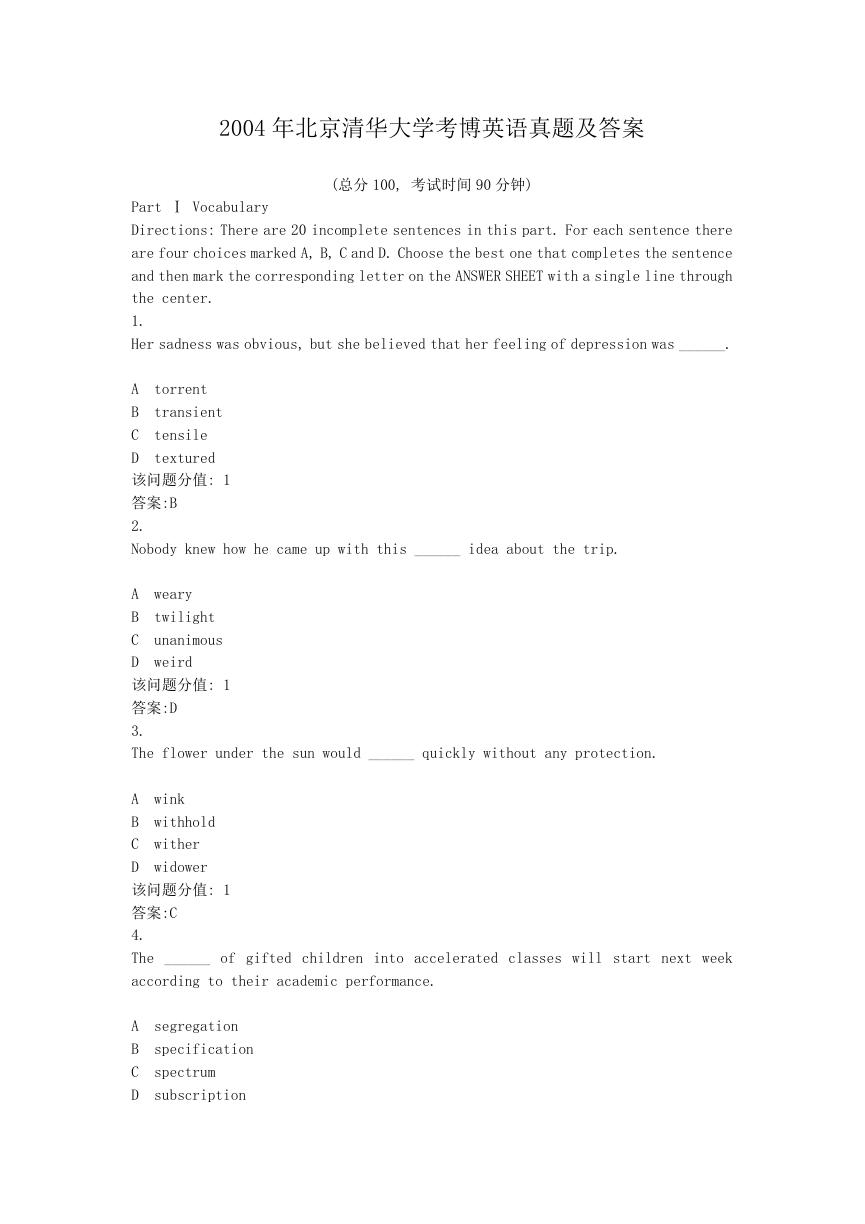
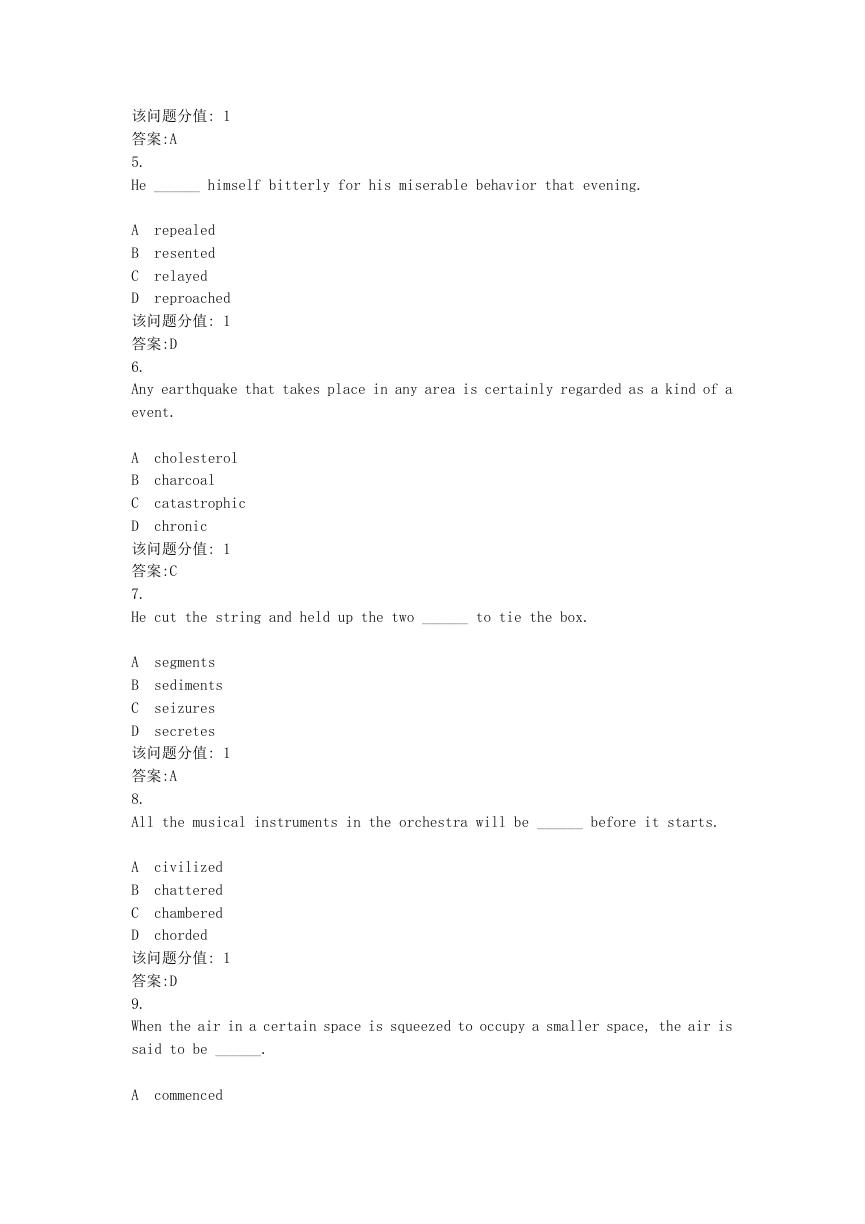
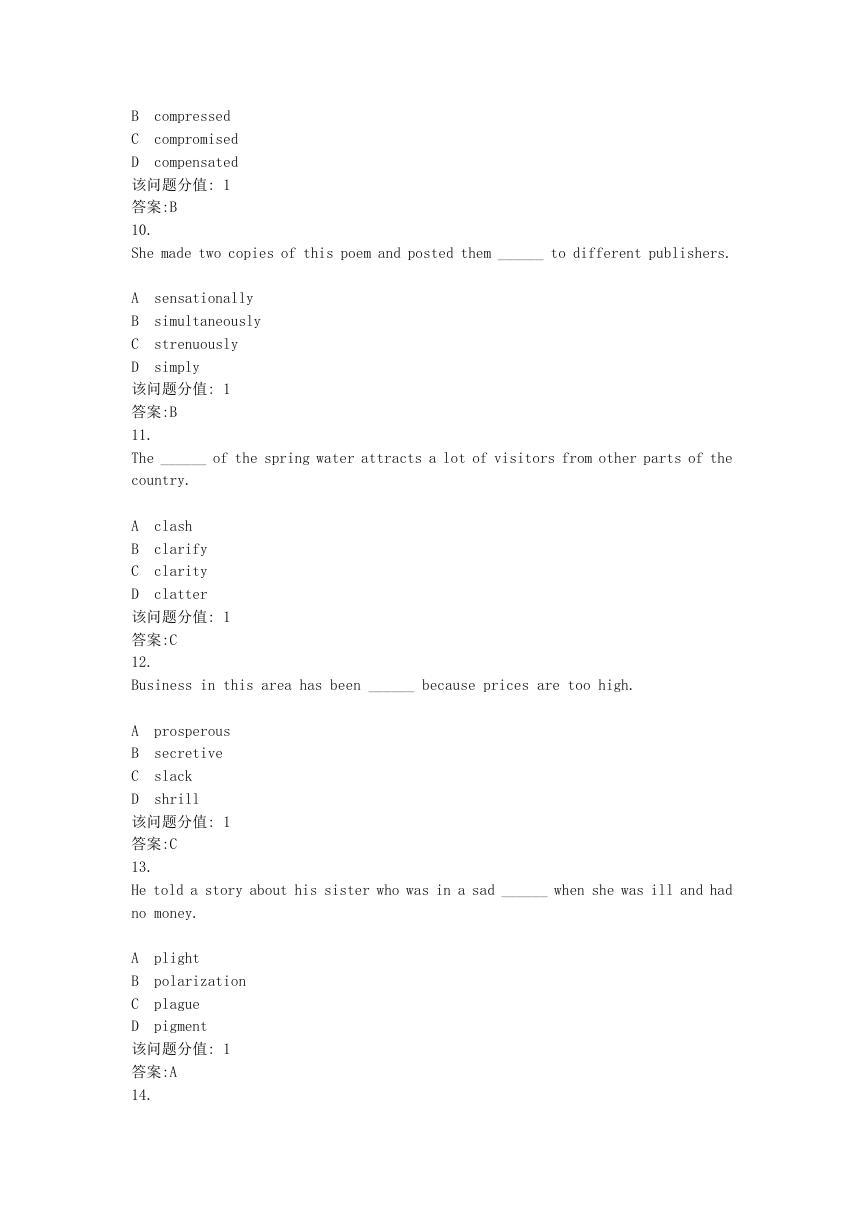
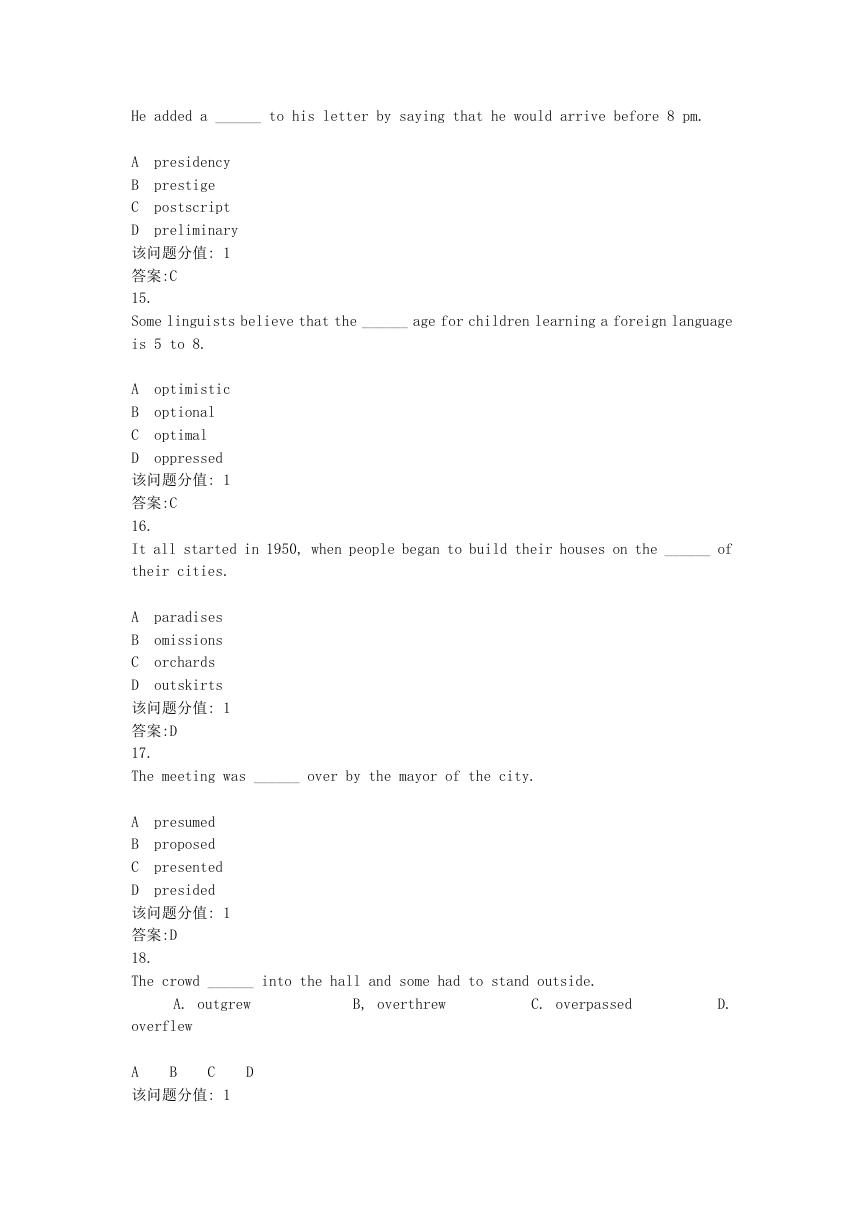

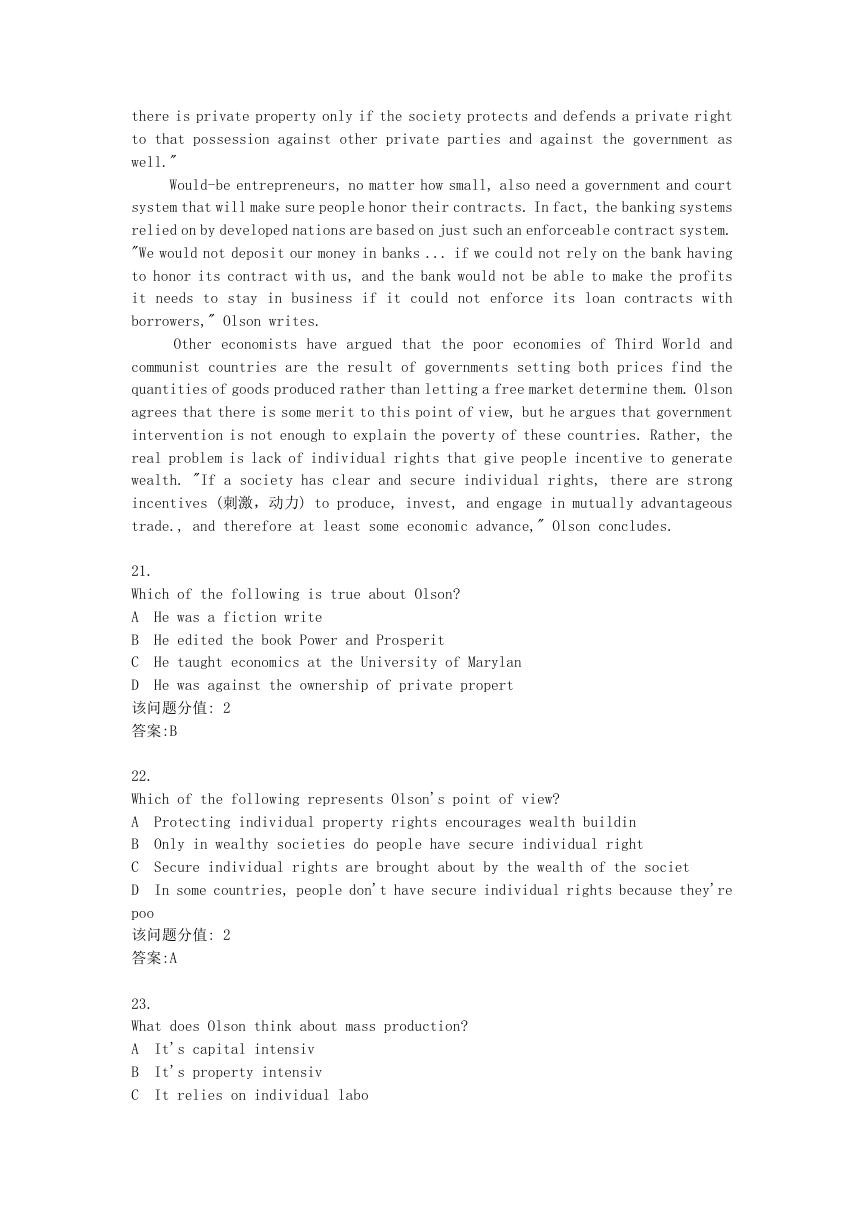
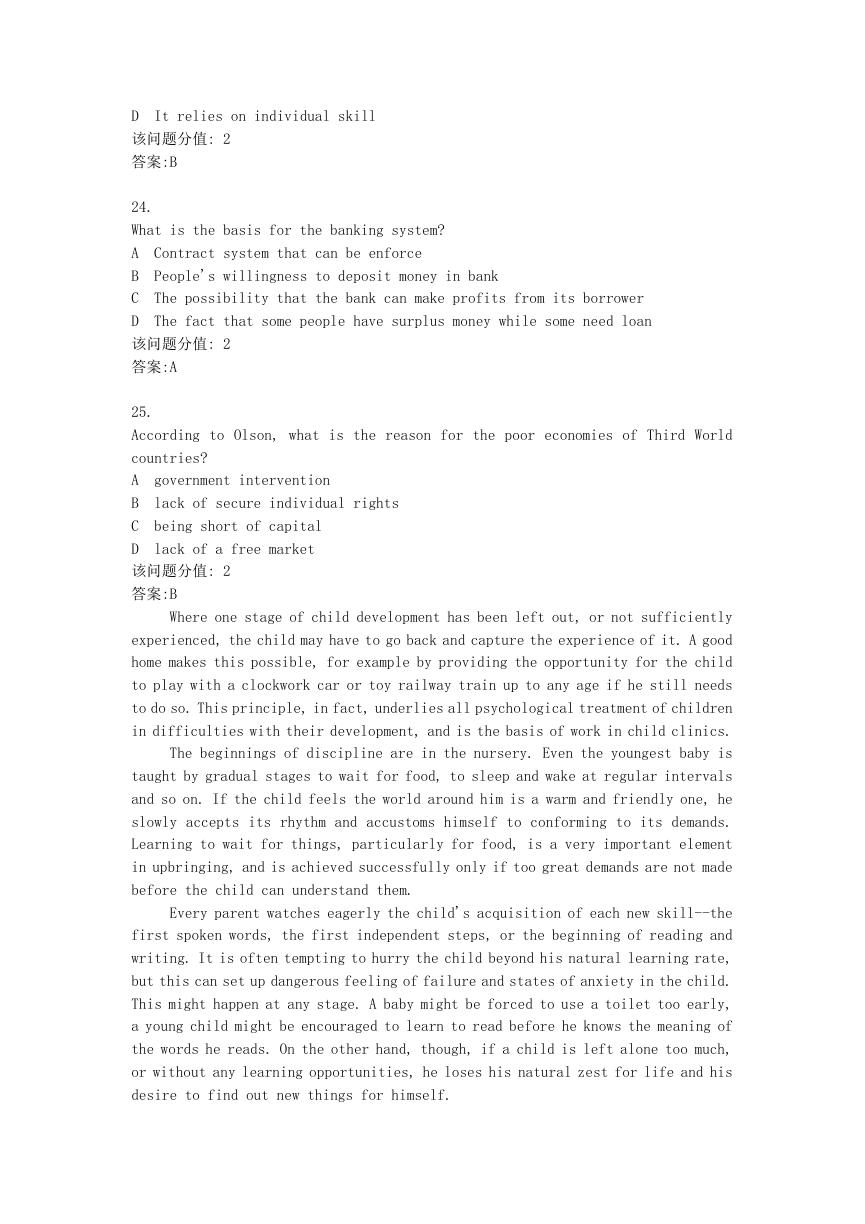
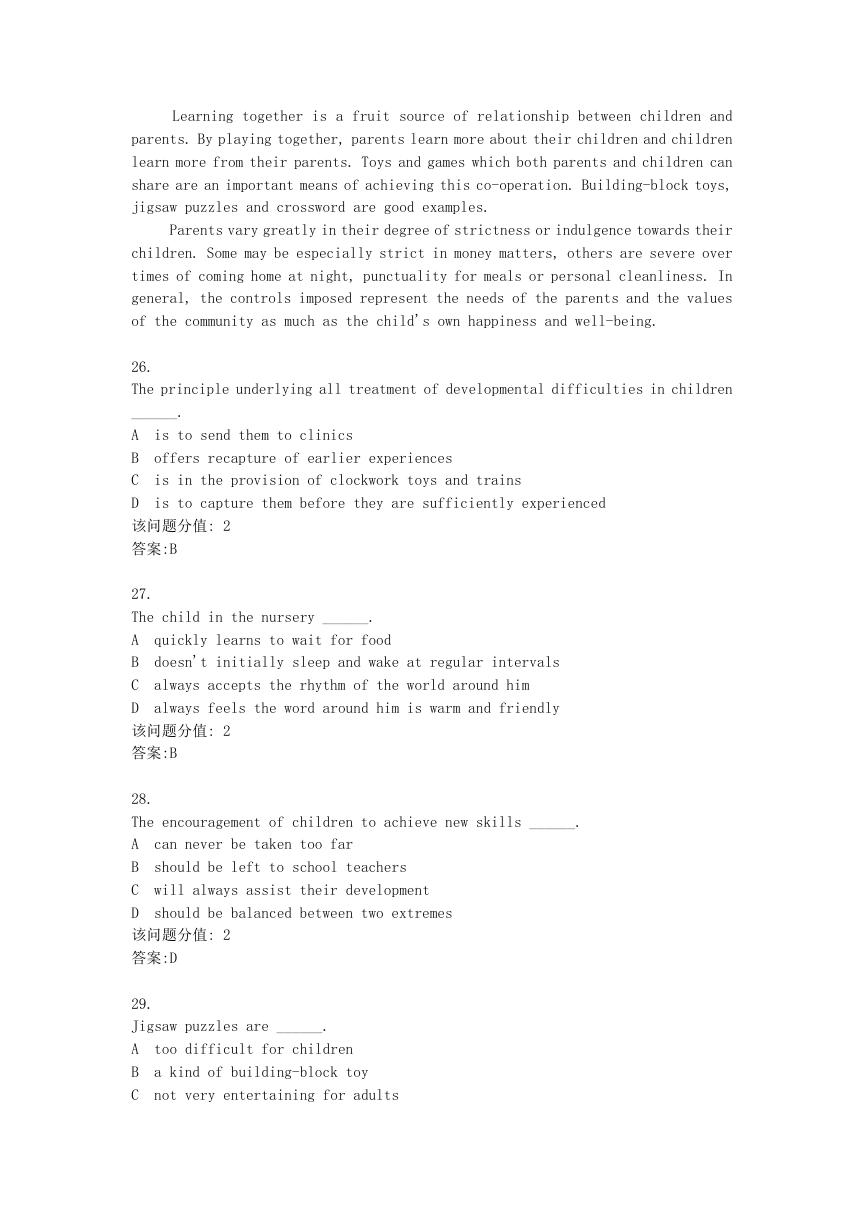








 2023年江西萍乡中考道德与法治真题及答案.doc
2023年江西萍乡中考道德与法治真题及答案.doc 2012年重庆南川中考生物真题及答案.doc
2012年重庆南川中考生物真题及答案.doc 2013年江西师范大学地理学综合及文艺理论基础考研真题.doc
2013年江西师范大学地理学综合及文艺理论基础考研真题.doc 2020年四川甘孜小升初语文真题及答案I卷.doc
2020年四川甘孜小升初语文真题及答案I卷.doc 2020年注册岩土工程师专业基础考试真题及答案.doc
2020年注册岩土工程师专业基础考试真题及答案.doc 2023-2024学年福建省厦门市九年级上学期数学月考试题及答案.doc
2023-2024学年福建省厦门市九年级上学期数学月考试题及答案.doc 2021-2022学年辽宁省沈阳市大东区九年级上学期语文期末试题及答案.doc
2021-2022学年辽宁省沈阳市大东区九年级上学期语文期末试题及答案.doc 2022-2023学年北京东城区初三第一学期物理期末试卷及答案.doc
2022-2023学年北京东城区初三第一学期物理期末试卷及答案.doc 2018上半年江西教师资格初中地理学科知识与教学能力真题及答案.doc
2018上半年江西教师资格初中地理学科知识与教学能力真题及答案.doc 2012年河北国家公务员申论考试真题及答案-省级.doc
2012年河北国家公务员申论考试真题及答案-省级.doc 2020-2021学年江苏省扬州市江都区邵樊片九年级上学期数学第一次质量检测试题及答案.doc
2020-2021学年江苏省扬州市江都区邵樊片九年级上学期数学第一次质量检测试题及答案.doc 2022下半年黑龙江教师资格证中学综合素质真题及答案.doc
2022下半年黑龙江教师资格证中学综合素质真题及答案.doc